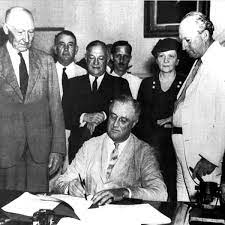Part 1: Summary At the outset of the 1930s, the American economy was in peril. The Great Depression had left millions of people, particularly the elderly, unemployed and impoverished. Such was the economic environment that President Roosevelt inherited in 1933, and his immediate task was to remedy the financial ailments of the country. Because the traditional modes of economic security had failed in the face of such a crisis, Americans needed a safety net. In order to respond to the situation, Roosevelt began a series of reforms collectively entitled the New Deal, part of which included the creation of a …
The Social Security Act of 1935: A Legislative History









